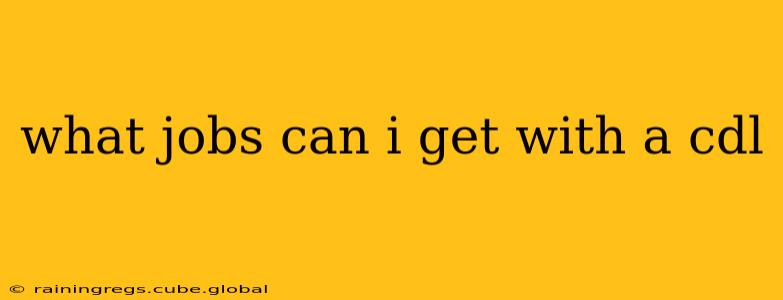A Commercial Driver's License (CDL) opens doors to a wide variety of exciting and lucrative career opportunities. More than just driving a truck, a CDL empowers you with the skills and certification to operate various commercial vehicles, leading to diverse roles within the transportation industry. This guide explores the many job options available with a CDL, helping you navigate your career path and find the perfect fit.
What Types of CDLs Are There?
Before diving into specific jobs, it's crucial to understand the different CDL classes. The class you hold dictates the types of vehicles you're qualified to operate. Common classes include:
- Class A CDL: Allows you to drive combination vehicles (e.g., tractor-trailer) with a gross combined weight rating (GCWR) of 26,001 or more pounds, provided the towed vehicle weighs at least 10,001 pounds. This is the most common and versatile CDL class.
- Class B CDL: Permits driving vehicles with a gross vehicle weight rating (GVWR) of 26,001 or more pounds, or vehicles towing a trailer with a GVWR of 10,000 pounds or less. Examples include large buses, dump trucks, and tow trucks.
- Class C CDL: Allows driving vehicles designed to transport 16 or more passengers (including the driver) or those transporting hazardous materials.
Many jobs require specific endorsements, such as those for hazardous materials (H), passenger (P), and school bus (S). These endorsements add to your skillset and broaden employment possibilities.
What Jobs Can I Get With a Class A CDL?
A Class A CDL is a highly sought-after qualification, offering a broad spectrum of job opportunities. Here are some popular choices:
- Over-the-Road (OTR) Truck Driver: This involves long-haul trucking, covering significant distances and often requiring extended periods away from home. Pay can be substantial, but it comes with the demands of long hours and time away from family.
- Local Truck Driver: This involves shorter routes, typically within a specific region or city. It offers a better work-life balance compared to OTR driving, with more frequent home time.
- Regional Truck Driver: A compromise between OTR and local driving, regional trucking involves routes covering a wider area but still allowing for more predictable home time than OTR positions.
- Hazmat Driver (with H Endorsement): This specialized role involves transporting hazardous materials, requiring additional training and adherence to strict safety regulations. Pay is often higher due to the increased responsibility.
- Heavy Haul Driver: These drivers transport oversized or heavy loads, demanding specialized skills and experience. This niche sector offers potential for higher earnings.
What Jobs Can I Get With a Class B CDL?
A Class B CDL opens doors to a slightly different set of opportunities, often involving shorter routes and a greater variety of vehicle types. Popular options include:
- Bus Driver: This includes roles ranging from city transit buses to school buses (requires S endorsement) and tour buses. It offers a more people-focused aspect of the transportation industry.
- Delivery Truck Driver: Many companies utilize Class B vehicles for local deliveries, often involving smaller routes and more frequent stops.
- Dump Truck Driver: These drivers operate dump trucks, typically involved in construction and waste management. It can be physically demanding work, but offers steady employment.
- Concrete Mixer Driver: A specialized role involving the transport and delivery of concrete to construction sites. This requires precision and timing to ensure the concrete remains usable.
- Tow Truck Driver: Requires skillful maneuvering and often involves emergency situations. It can be physically demanding but offers a sense of helping others in need.
What Jobs Can I Get With a Class C CDL?
While often overlooked, a Class C CDL can still lead to fulfilling careers, particularly those focused on passenger transportation or hazardous materials handling:
- School Bus Driver (with S Endorsement): A rewarding job that involves transporting children to and from school. It requires patience, responsibility, and a strong commitment to safety.
- Transit Bus Driver: Similar to a school bus driver, but operating within a public transportation system. Requires familiarity with routes and schedules.
- Hazmat Driver (with H Endorsement): Transporting hazardous materials in smaller vehicles.
What are the salary expectations for CDL jobs?
Salaries for CDL jobs vary considerably depending on factors like location, experience, company, and the type of driving. Generally, OTR drivers tend to earn more than local drivers, and specialized roles like hazmat or heavy haul driving also command higher pay. Researching salary ranges in your specific area is crucial to understanding potential earnings.
How Do I Get a CDL?
To obtain a CDL, you'll need to meet specific requirements, including passing a written and driving test. Many trucking schools offer comprehensive training programs that prepare you for both the licensing process and the demands of the job.
What are the benefits of having a CDL?
Beyond the wide range of job opportunities, a CDL offers several advantages:
- High demand: The transportation industry always needs qualified drivers.
- Good earning potential: Many CDL jobs offer competitive salaries and benefits.
- Job security: The consistent demand for drivers ensures relative job security.
- Travel opportunities: OTR driving, in particular, provides opportunities to see different parts of the country.
- Skill development: CDL training builds valuable skills applicable to various transportation-related fields.
This guide provides a general overview. For specific information regarding CDL requirements and job opportunities in your area, it's advisable to consult local driving schools, trucking companies, and employment agencies. Your future career in the transportation industry awaits!
